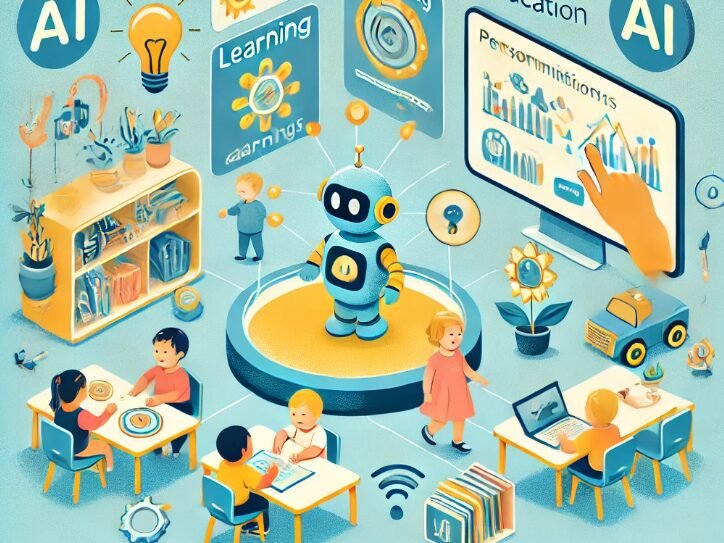Artificial Intelligence (AI) is making its way into various aspects of our lives, and education is no exception. While AI has been widely discussed in the context of higher education and professional training, its application in early childhood education is a relatively new and evolving area. AI promises to revolutionize early learning by offering personalized educational experiences, enhancing engagement, and supporting teachers. However, the introduction of AI in early childhood education also brings potential pitfalls that must be carefully considered.
Transformative Power of AI for Assessment Dashboards and Performance Reports
Promises of AI in Early Childhood Education
1. Personalized Learning
One of the most significant advantages of AI in early childhood education is its ability to personalize learning experiences. AI-driven platforms can assess a child’s learning style, pace, and preferences, and then tailor educational content to meet their specific needs. This personalized approach can help young learners grasp concepts more effectively and at their own pace, reducing frustration and encouraging a love for learning from an early age.
2. Enhanced Engagement
AI-powered tools and applications can make learning more interactive and engaging for young children. Through the use of AI-driven educational games, interactive stories, and adaptive learning apps, children can learn through play, which is a critical aspect of early childhood education. These tools can adapt in real-time to a child’s responses, ensuring that the content remains challenging yet achievable, keeping the child motivated and engaged.
3. Support for Educators
AI can also provide significant support for early childhood educators. By automating routine tasks such as tracking progress, grading, and generating reports, AI allows teachers to focus more on direct interaction with students. Additionally, AI can offer insights into each child’s development, helping educators identify areas where a child may need additional support or enrichment.
Pitfalls of AI in Early Childhood Education
1. Over-Reliance on Technology
One of the primary concerns with the integration of AI in early childhood education is the potential for over-reliance on technology. While AI can be a valuable tool, it should not replace the critical human interaction that is essential for young children’s development. Early childhood is a time when children learn social, emotional, and communication skills through interactions with peers and adults. Excessive use of AI-driven tools could reduce these vital human interactions, potentially hindering social development.
2. Privacy and Data Security
The use of AI in early childhood education involves collecting and analyzing large amounts of data, including personal information about young children. This raises significant concerns about privacy and data security. Parents and educators must ensure that AI tools comply with strict data protection regulations and that any data collected is stored securely and used responsibly.
3. Equity and Access
Another potential pitfall is the risk of exacerbating existing inequalities in education. Access to AI-driven educational tools may be limited by socioeconomic factors, with children from lower-income families having less access to these technologies. This digital divide could widen the achievement gap, leaving some children at a disadvantage.
4. Quality of Content
The quality of AI-driven educational content is another area of concern. Not all AI tools are created equal, and some may provide content that is not developmentally appropriate for young children. Educators and parents must carefully evaluate AI tools to ensure they align with educational best practices and the developmental needs of early learners.
Conclusion
AI holds great promise for enhancing early childhood education by offering personalized learning experiences, boosting engagement, and supporting educators. However, it is crucial to approach the integration of AI with caution, ensuring that it complements rather than replaces essential human interactions. By addressing the potential pitfalls—such as over-reliance on technology, privacy concerns, equity issues, and content quality—educators and parents can harness the benefits of AI while safeguarding the developmental needs of young children.
Visit The Case HQ for 95+ courses
Read More:
Practical Applications of Generative AI in Education: Turning Innovation into Daily Practice
The Future of Learning and Assessment: Redefining Education for an AI-Driven Era
Designing the Future Faculty: A Practical Guide to Academic and Faculty Development
Mastering Case Study Writing and Teaching: A Practical Guide for Business Educators
The Future of Education: AI and Digital Transformation in the Classroom
Gamification in Education: Beyond Points and Badges – Strategies That Truly Engage
High-Impact Blended Learning Models That Work in 2025
Step-by-Step Guide: Backward Design in Course Planning for Effective Teaching
From Traditional to Transformative: The Evolution of Pedagogy in Modern Education
Game-Changing Power of Automating Constructive Feedback Using LLMs in Education
Critical Ethical Considerations in AI-Based Testing Every Educator Must Know
How to Build a Powerful AI-Enabled Assessment Ecosystem for Future-Ready Learning
How AI Simplifies Grading and Reporting Workflows for Educators and Institutions



Responses